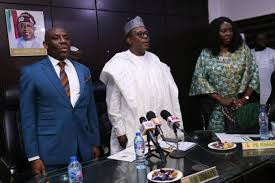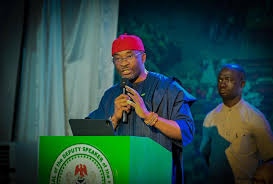
UMFOLOZI, SOUTH AFRICA - OCTOBER 12: Departing procession at the Special Official Funeral for Ambassador Nathi Mthethwa at Siyabonga Sangweni Sport Complex on October 12, 2025 in Umfolozi, South Africa. According to media reports, Ambassador Nathi Mthethwa was found dead, in what French authorities suspect was a suicide, after falling from the 22nd floor of the Hyatt Regency Paris Étoile hotel on September 30th. (Photo by Gallo Images/Darren Stewart)
When the news broke that SA’s ambassador to France, Nathi Mthethwa, fell 22 storeys to his death in a Paris hotel, the shock rippled through Pretoria’s corridors of power and the diplomatic community alike.
What was first described as a “tragic loss due to natural causes” has since evolved into a fog of speculation, secrecy, and contradiction.
Weeks later, the SA government has yet to provide a full, transparent account of what exactly happened, leaving room for theories that range from the plausible to the chilling.
The department of international relations and cooperation (Dirco) was, at first, quick to issue a statement, expressing its condolences and assuring the public that the ambassador’s death was the result of a “sudden health complication”.
But friends and colleagues confirmed that he had appeared healthy and energetic in recent engagements, attending a cultural diplomacy event just two days before his death.
Yet, the swift classification of his death as “natural causes”, without any mention of a medical report or post-mortem findings, raised early doubts.
In diplomatic tradition, deaths of serving ambassadors abroad are treated with meticulous transparency. But in this case, the French authorities deferred details to Pretoria – and Pretoria said little.
The silence, rather than reassuring the public, has only deepened suspicion, with lingering questions such as whether it was meant to keep something bigger under wraps.
This controversial theory points to internal political tensions within the ANC-led government.
The ambassador, a career diplomat with close ties to the liberation movement, was reportedly due to return home for reassignment discussions.
Sources suggest he had grown increasingly frustrated with certain government policies and the behaviour of senior officials in the foreign service.
Whispers from inside Dirco hint he may have been in possession of sensitive documents or had expressed concerns about irregular spending within embassies.
ALSO READ: Mthethwa family welcome Saps support to French authorities as they probe death
Could his death, then, have been politically motivated, an act of silencing a man who knew too much?
Those who advance this theory point to South Africa’s long and complicated history of internal political rivalries, where loyalty and silence are often more valuable than transparency.
The timing of his death, amid renewed debates about diplomatic accountability and financial mismanagement, only fuels the sense of unease.
Still, without hard evidence, the political murder narrative remains circumstantial.
Yet, the refusal by both Pretoria and Paris to release the ambassador’s communication records invites exactly this kind of speculation.
Then there is the most unsettling possibility, one that moves beyond local politics and into the shadowy world of international intelligence.
France, a key player in both African and European security affairs, has been at the centre of growing global tensions, including the war in Ukraine, the Sahel conflicts and debates over Africa’s shifting alliances.
The ambassador was known for his sharp intellect and deep understanding of international power dynamics.
Some suggest he had become a conduit of sensitive information between African states and European agencies, or perhaps he could have stumbled upon intelligence too delicate to expose.
One rumour circulating among former intelligence operatives hints his death bore the “fingerprints” of a professional operation: clean, untraceable, and politically deniable.
Dirco, when pressed for comment, dismissed such speculation as “reckless conspiracy”.
ALSO READ: Ramaphosa lauds Mthethwa as ‘unapologetic activist’
Yet, the lack of transparency continues to breed questions, rather than certainty. This is not the first time South Africa has found itself caught in a diplomatic mystery.
The 2015 killing of a South African defence attaché in Burundi, the unexplained car accident of a trade envoy in Nigeria and the sudden death of a cultural diplomat in Cuba, all remain cases wrapped in secrecy.
Each time, the official explanation leaned toward “natural causes” and, each time, the lack of documentation left families and citizens uneasy.
The death of Mthethwa now fits into this unsettling pattern – a tendency by Pretoria to protect the state’s image, rather than pursue truth with full disclosure.
What makes this case especially troubling is its context. South Africa is repositioning itself globally, balancing relations between the West, Brics partners and Africa’s own political blocs.
Diplomats are not just messengers, they are instruments of strategy, influence and, sometimes, secrets. When one dies suddenly in a world capital, it is never just a personal tragedy. It’s a political event.
Ultimately, the ambassador’s death leaves behind more questions than answers. Was it a suicide, a politically motivated act, or the fallout of covert international dealings?
In the absence of transparency, the vacuum fills itself, with whispers, theories, and doubt.
For a nation that has long prided itself on its moral stance in global affairs, South Africa’s handling of this case reflects a worrying trend: secrecy over accountability, control over truth.
In the absence of transparency, the vacuum fills itself, as diplomatic deaths are supposed to be investigated, documented and disclosed in the spirit of public trust.
Yet, here we are, weeks later, with no timeline, no clarity and no closure. Perhaps the real mystery is not how the ambassador died, but why South Africans are being asked not to ask.
NOW READ: Masemola says Zuma and Mthethwa targeted Crime Intelligence over cars being taken away



